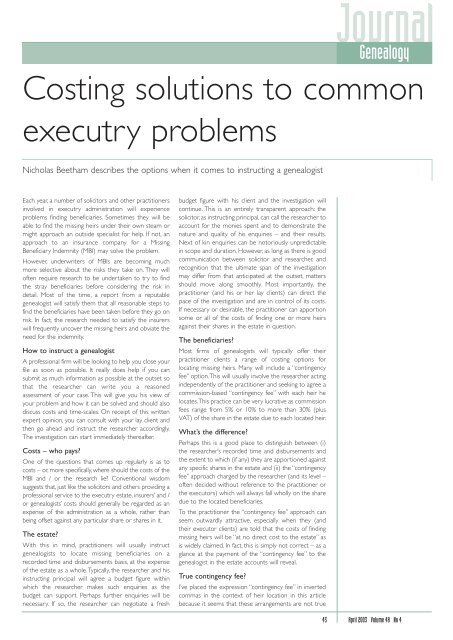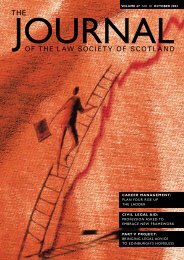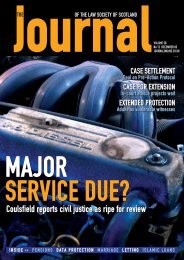Law Society of Scotland - The Journal Online
Law Society of Scotland - The Journal Online
Law Society of Scotland - The Journal Online
Create successful ePaper yourself
Turn your PDF publications into a flip-book with our unique Google optimized e-Paper software.
Nicholas Beetham describes the options when it comes to instructing a genealogist<br />
<strong>Journal</strong><br />
Genealogy<br />
Costing solutions to common<br />
executry problems<br />
Each year, a number <strong>of</strong> solicitors and other practitioners<br />
involved in executry administration will experience<br />
problems finding beneficiaries. Sometimes they will be<br />
able to find the missing heirs under their own steam or<br />
might approach an outside specialist for help. If not, an<br />
approach to an insurance company for a Missing<br />
Beneficiary Indemnity (MBI) may solve the problem.<br />
However, underwriters <strong>of</strong> MBIs are becoming much<br />
more selective about the risks they take on. <strong>The</strong>y will<br />
<strong>of</strong>ten require research to be undertaken to try to find<br />
the stray beneficiaries before considering the risk in<br />
detail. Most <strong>of</strong> the time, a report from a reputable<br />
genealogist will satisfy them that all reasonable steps to<br />
find the beneficiaries have been taken before they go on<br />
risk. In fact, the research needed to satisfy the insurers<br />
will frequently uncover the missing heirs and obviate the<br />
need for the indemnity.<br />
How to instruct a genealogist<br />
A pr<strong>of</strong>essional firm will be looking to help you close your<br />
file as soon as possible. It really does help if you can<br />
submit as much information as possible at the outset so<br />
that the researcher can write you a reasoned<br />
assessment <strong>of</strong> your case. This will give you his view <strong>of</strong><br />
your problem and how it can be solved and should also<br />
discuss costs and time-scales. On receipt <strong>of</strong> this written<br />
expert opinion, you can consult with your lay client and<br />
then go ahead and instruct the researcher accordingly.<br />
<strong>The</strong> investigation can start immediately thereafter.<br />
Costs – who pays?<br />
One <strong>of</strong> the questions that comes up regularly is as to<br />
costs – or, more specifically, where should the costs <strong>of</strong> the<br />
MBI and / or the research lie? Conventional wisdom<br />
suggests that, just like the solicitors and others providing a<br />
pr<strong>of</strong>essional service to the executry estate, insurers’ and /<br />
or genealogists’ costs should generally be regarded as an<br />
expense <strong>of</strong> the administration as a whole, rather than<br />
being <strong>of</strong>fset against any particular share or shares in it.<br />
<strong>The</strong> estate?<br />
With this in mind, practitioners will usually instruct<br />
genealogists to locate missing beneficiaries on a<br />
recorded time and disbursements basis, at the expense<br />
<strong>of</strong> the estate as a whole.Typically, the researcher and his<br />
instructing principal will agree a budget figure within<br />
which the researcher makes such enquiries as the<br />
budget can support. Perhaps further enquiries will be<br />
necessary. If so, the researcher can negotiate a fresh<br />
budget figure with his client and the investigation will<br />
continue. This is an entirely transparent approach: the<br />
solicitor, as instructing principal, can call the researcher to<br />
account for the monies spent and to demonstrate the<br />
nature and quality <strong>of</strong> his enquiries – and their results.<br />
Next <strong>of</strong> kin enquiries can be notoriously unpredictable<br />
in scope and duration. However, as long as there is good<br />
communication between solicitor and researcher, and<br />
recognition that the ultimate span <strong>of</strong> the investigation<br />
may differ from that anticipated at the outset, matters<br />
should move along smoothly. Most importantly, the<br />
practitioner (and his or her lay clients) can direct the<br />
pace <strong>of</strong> the investigation and are in control <strong>of</strong> its costs.<br />
If necessary or desirable, the practitioner can apportion<br />
some or all <strong>of</strong> the costs <strong>of</strong> finding one or more heirs<br />
against their shares in the estate in question.<br />
<strong>The</strong> beneficiaries?<br />
Most firms <strong>of</strong> genealogists will typically <strong>of</strong>fer their<br />
practitioner clients a range <strong>of</strong> costing options for<br />
locating missing heirs. Many will include a “contingency<br />
fee” option.This will usually involve the researcher acting<br />
independently <strong>of</strong> the practitioner and seeking to agree a<br />
commission-based “contingency fee” with each heir he<br />
locates.This practice can be very lucrative as commission<br />
fees range from 5% or 10% to more than 30% (plus<br />
VAT) <strong>of</strong> the share in the estate due to each located heir.<br />
What’s the difference?<br />
Perhaps this is a good place to distinguish between (i)<br />
the researcher’s recorded time and disbursements and<br />
the extent to which (if any) they are apportioned against<br />
any specific shares in the estate and (ii) the “contingency<br />
fee” approach charged by the researcher (and its level –<br />
<strong>of</strong>ten decided without reference to the practitioner or<br />
the executors) which will always fall wholly on the share<br />
due to the located beneficiaries.<br />
To the practitioner the “contingency fee” approach can<br />
seem outwardly attractive, especially when they (and<br />
their executor clients) are told that the costs <strong>of</strong> finding<br />
missing heirs will be “at no direct cost to the estate” as<br />
is widely claimed. In fact, this is simply not correct – as a<br />
glance at the payment <strong>of</strong> the “contingency fee” to the<br />
genealogist in the estate accounts will reveal.<br />
True contingency fee?<br />
I’ve placed the expression “contingency fee” in inverted<br />
commas in the context <strong>of</strong> heir location in this article<br />
because it seems that these arrangements are not true<br />
45 April 2003 Volume 48 No 4










